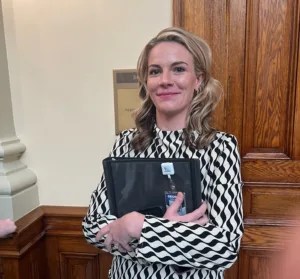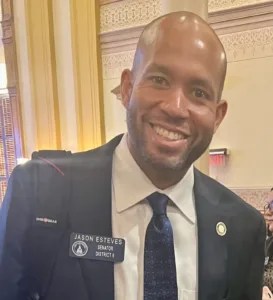Stay ahead of the curve as a political insider with deep policy analysis, daily briefings and policy-shaping tools.
Request a DemoGeorgia bypasses federal help, forges own path with older foster care youth, but is it enough?

Young adults enjoying a conversation. (Credit: Gagliardi)
Part 3 of a recurring series on the state’s foster care system and those aging out of it. Read Part 1 here and Part 2 here.
In the last year and a half, Georgia has spent more than $42 million of its own money providing housing and other extended care services to hundreds of young adults getting ready to age out of its foster care system.
It’s a tidy sum but child advocates say Georgia has access to millions more in federal dollars to help foster youth between the ages of 18 and 21. But state officials continue to bypass the federal money saying the process for getting it is too complicated.

“Georgia can go further,” Todd Lloyd, senior policy associate at the Annie E. Casey Foundation, told State Affairs. “You can go further for these young people. And you could go further than what it currently is if they were to partner with the federal government towards these costs.”
Georgia forging own path
Some 36 states and Washington, D.C. are participating in Title IV-E extended foster care, a federal program that reimburses them for providing extended care foster care to young people between the ages of 18 and 21. These states get millions of dollars in reimbursement — ranging from 50 cents to 80 cents back for every $1 spent — for housing, feeding, clothing and other services and resources given to older foster youth. The reimbursements also cover staff pay and training and case management — all administrative tasks tied to providing extended foster care for young adults.
Georgia, however, isn’t participating in the federal Title IV-E extended foster care program, consequently, it is leaving millions of dollars on the table, according to child welfare and advocacy experts.
“Extended foster care is fully state-funded,” Candice Broce, commissioner of the Georgia Department of Human Services, told State Affairs. “Because we’re state-funded, we have more flexibility in how we run the program. And we can actually do more than what the IV-E funds and those restrictions [allow].”
Broce’s agency oversees the state’s foster care system.

“It’s far more extensive documentation,” Broce said, when asked to explain the restrictions. “Right now, in the 40 programs that we do for our kids entering foster care, we have a whole team whose only job is to run their eligibility, and it takes months and months and months and constant calculations. It’s very complex. They’re essentially accountants. So I think that’s probably what it is. It’s basically burdensome documentation. It’s [extended care for older youth] already state-funded. We have no shortage of funds from the state to make sure we have those kids and expenditure.”
In the first half of fiscal year 2024, which ran from last July to December 2023, the state spent $13 million to provide extended care for older foster youth. There are currently 648 young adults in Georgia’s extended foster care program.
“If they’re spending $13 million, I’m sure some of those older youth are eligible under Title IV-E because some of them are still in high school who are not working or not working very much,” Lloyd said. Georgia could be getting reimbursed at least 50 cents for every dollar it spends helping young adults through its extended care program, Lloyd noted.
Neighboring Tennessee, for instance, served 691 young people between the ages of 18 and 21 in its federally-supported extended foster care program last year. The state has been involved since 2010 in the Title IV-E Extension of Foster Care program which has reimbursed the state for placing youth in foster homes or supervised independent living and staff case management costs for each young adult. The program has also helped young people get jobs and transportation and go to college and pursue other advanced degrees as well as other wraparound services.
In fiscal year 2023, for instance, Tennessee received over $1.25 million from the Title IV-E Extension of Foster Care program or $1,809.88 per young person. That’s in addition to the money the state was already spending for extended care.
“It afforded Tennessee the opportunity to serve more young adults in their transition into adulthood,” Courtney Matthews, director of Independent Living for the Tennessee Department of Children’s Services, told State Affairs. “Prior to the Title IV-E Extension of Foster Care program, Tennessee served young adults that aged out of foster care on a limited basis who were pursuing secondary education.”
Tennessee has a “team of Independent Living Specialists in all 12 regions of the state that assists the young adults with completing the Title IV-E application and other Extension of Foster Care initial paperwork,” Matthews said. The application process is done by the Maximization Specialist in each region to determine young people’s eligibility for Title IV-E extended funds, she added.
Similarly, South Carolina, which at one time didn’t even have extended care for foster youth over age 18, is in the process of implementing its own federally-supported Title IV-E extended care program for those young adults. Officials with the South Carolina Department of Social Services declined to discuss the program because it’s still new to them.
Georgia meanwhile has preferred to strike out on its own when it comes to providing extended care for its young adults in foster care. Despite its claims of success and self-sufficiency, the state may be falling short, particularly in rural areas. Several nonprofits across the state have stepped in to assist young people aging out of foster care who are falling through the cracks.
The number of young adults coming into and leaving the child welfare/foster care system at any given time is “fluid,” said Melissa Carter, director of the Barton Child Law and Policy Center at Emory Law School. Thus, it’s hard to keep exact track of the number of youth benefitting from the state’s program at any given point.
“Overall, our extended youth support services is a real positive feature of our child welfare and foster care systems [in Georgia],” Carter said. “I’m much more interested in the adequacy and quality of the services and opportunities that are provided to our young adults than about what the source of funding is.”
The biggest challenge is finding adequate and affordable housing for young people who are struggling to make ends meet or who need a place to stay when the college they’re attending closes for holiday breaks, Carter said, adding, “They’re at a vulnerable time of transition in their lives and we don’t have the ability to provide them with that stability.”
The cost of dismantling
Last year, 539 young people turned 18 while in foster care in Georgia, according to Kylie Winton, a spokesperson for the Georgia Department of Human Services. They either signed themselves into the department’s custody voluntarily for extended youth services or they left foster care altogether.
All told, 5.7% of the young people in Georgia foster care are between the ages of 18 and 21, Winton said. Although the state has extended foster care for young people to the age of 21, some are choosing to leave the system.
About 700 kids age out of Georgia’s foster care system each year, according to Connections Homes, a nonprofit that works to link young adults with families.
In fact, more youth “age out” of the system in Georgia than the rest of the country. The Annie E. Casey Foundation report found that 59% of Georgia foster kids age out versus 52% nationwide. Black and Hispanic youth disproportionately leave with no viable support, the report noted. Among 21 year olds, roughly 1 in 4 who left Georgia’s foster care system ended up homeless in 2021, according to the Casey report.
One child welfare expert said any additional money that could help young adults in foster care transition smoothly into adulthood would be an asset for Georgia.
“In general, the more money that we can get to provide assistance to these kids, the better off they’ll be as adults and that just really adds to the stability of our own economy and for our communities,” Bobby Cagle, head of the child welfare division of Caresource, a nonprofit that provides public health programs such as Medicaid and Medicare, told State Affairs.
Cagle headed Georgia’s Department of Family and Children Services and served as commissioner of Early Care and Learning between 2011 and 2017. Cagle declined to comment on whether Georgia should be participating in the federal Title IV-E program, saying, “I would need to really study the figures before I can comment intelligently on that. I’ve not looked at their budget since 2017.”
Some child advocacy agencies were reluctant to talk about the state’s decision to bypass the Title IV-E reimbursement program because they have to work closely with state lawmakers and depend on the state for funding.
Observers noted that the Department of Human Services, which oversees foster care, is dealing with a barrage of other issues such as the Medicaid eligibility determination process known as Medicaid unwinding. The agency is also running behind on its eligibility process for the Supplemental Nutrition Assistance Program, or SNAP, a federal food program for low-income families.
Putting the federal Title IV-E extended care program in place in Georgia would be “incredibly complicated and not easy and will involve system changes in multiple ways like financial system changes, process system changes,” said a spokesman for one child advocacy organization who asked not to be named. “The undoing and the dismantling of the current system would be really hard and it’s not a priority because it’s hard,” she said.
Broaching the subject
Foster care has taken on heightened importance in the Senate in the last year, with leadership creating a special study committee to zero in on the foster care issue more thoroughly.
The Senate Study Committee on Foster Care and Adoption was created by the passage of Senate Resolution 282 during the 2023 legislative session to elevate the issue of foster care. The issue is one of Lt. Gov. Burt Jones’ top priorities to better address the needs of families and children, especially those in the state adoption and foster care system. The study committee released a final report of recommendations last November for lawmakers.
State Affairs reached out to all 10 members of the Senate Committee on Children and Families for comment about the state’s non-participation in the federal extended care program.
“This decision is up to the governor. I don’t know enough about it to comment,” said Sen. Kay Kirkpatrick, R-Marietta, who chairs both the children and families committee and the Study Committee on Foster Care and Adoption.
But another children and families committee member said he plans to look into the federal Title IV-E extended foster care provision that would reimburse at least 50 cents on every dollar Georgia spends.

“That’s a significant injection of resources that those kids can have. And again, we’re talking about the most vulnerable children,” Sen. Jason Esteves, D-Atlanta, told State Affairs.
Esteves, who also was unaware of the situation, added, “My initial reaction is that in a time where state agencies are requesting more money and more resources to tackle some of these issues, we shouldn’t be turning away money. When we think about our foster care youth who are the most vulnerable in the state, we should be doing what we can to provide them with every resource they need. If that means doing additional paperwork, then we should be doing what we can to get them as many benefits.”
Esteves said he has noticed a trend among certain states of rejecting federal money “as a whole because of the burden that accepting that money may cause.”
“The problem with that is if we’re going to go solely on efficiencies, there are a lot of things that the state does that may not necessarily be an efficient way of using tax dollars that programs like this would help resolve,” Esteves said. “There’s a trend of Republican governors avoiding taking federal dollars partially to make a statement about their independence away from using federal funds, but also to make a statement that the programs that the federal government wants you to run are more inefficient than the programs the states are running. But if you are hearing from advocates in the state saying, ‘Hey, the program the state has is okay, but we can be doing a lot better with federal funding’…”
Esteves cited a recent case he read about where state officials told a woman they couldn’t help her with her rent which was due even though there was federal money available to do so. “A few months later, we [Georgia] took away her child for being in unsafe living conditions,” Esteves said.
Meanwhile, studies have shown that many older youth leaving foster care before they’re sufficiently prepared end up in jail, homeless or facing some other hardship.
“The reality is that their chances of winding up in jail or prison, where it will be exponentially more expensive to take care of them, is already high,” Esteves added. “We should be working on avoiding them going to jail.”
Esteves said he plans to broach the issue with the Senate Committee on Children & Families although, he said, “We’re pretty limited on what we can do as a committee. It’s not like we can force the governor to have his administration accept some of this funding.
“There can be an urgent resolution that we could potentially take up but that’s going to require the committee to agree to that,” Esteves said, noting that six of the 10 committee members are Republicans who may not agree. “And I have to have conversations with the chair [Kay Kirkpatrick] to make sure that not only that she’s aware, but that she’s concerned about it because if she isn’t concerned about it then the likelihood of anything happening in the committee is low.”
| MONTH | PAYMENTS | CHILDREN | AVG. PAID PER CHILD |
|---|---|---|---|
| FY 2023 | |||
| July 2022 | $2.213 million | 491 | $4,507.39 |
| August | $2.229 million | 493 | $4,521.61 |
| September | $2.077 million | 472 | $4,401.98 |
| October | $2.221 million | 473 | $4,696.03 |
| November | $2.126 million | 474 | $4,505.49 |
| December | $2.242 million | 486 | $4,615.14 |
| January 2023 | $2.276 million | 485 | $4,694.67 |
| February | $2.195 million | 473 | $4,641.13 |
| March | $2.283 million | 488 | $4,678.42 |
| April | $2.266 million | 476 | $4,762.13 |
| May | $4.622 million | 483 | $9,570.20 |
| June | $2.234 million | 477 | $4,683.44 |
| FY 2023 TOTAL | $28.989 million | ||
| FY 2024 | |||
| July 2023 | $2.278 million | 478 | $4,766 |
| August | $2.183 million | 471 | $4,636 |
| September | $2.089 million | 446 | $4,685 |
| October | $2.156 million | 451 | $4,781 |
| November | $2.049 million | 443 | $4,627 |
| December | $2.285 million | 397 | $5,757 |
| FY 2024 YTD | $13.042 million | ||
Have questions? Contact Tammy Joyner on X @lvjoyner or at [email protected].
And subscribe to State Affairs so you do not miss an update.
X @StateAffairsGA
Facebook @StateAffairsGA
Instagram @StateAffairsGA
LinkedIn @StateAffairs
Professionals still face licensing delays amid state’s transition to online system
The Gist Georgia’s professionals and business owners are still struggling to obtain professional licenses in a timely manner. As the Secretary of State’s Office rolls out its new Georgia Online Application Licensing System to expedite the process, the efficiency of this new process is being put to the test. What’s Happening Thursday morning at the …
Controversy over AP African American Studies class grows
Rashad Brown has been teaching Advanced Placement African American Studies at Atlanta’s Maynard Jackson High School for three years. He’ll continue to do so — even though the state’s top education official removed it from the list of state-funded course offerings for the upcoming school year. While Brown prepares to start teaching his class on …
Students, teachers, lawmakers blast decision to end AP African American history classes
ATLANTA — A coalition of lawmakers, civil rights leaders, clergy, educators and students Wednesday called on the state’s education czar to rescind his decision to drop an advanced placement African American studies class from the state’s curriculum for the upcoming school year. “This decision is the latest attack in a long-running GOP assault on Georgia’s …
Kamala Harris’ presidential bid reinvigorates Georgia Democrats
Georgia Democrats have gained new momentum heading into the November election, propelled by President Joe Biden’s decision to bow out of his reelection bid and hand the reins to Vice President Kamala Harris. The historic decision, announced Sunday, is expected to prove pivotal in the national and state political arenas and breathe new life and …




